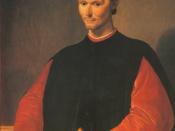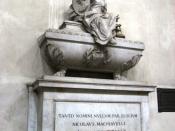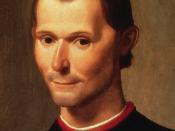Niccolo Machiavelli's highly controversial book The Prince succeeds in allowing several oppositions to emerge. Among these oppositions include fortuna and virtu. These two terms increase the ambiguity of Machiavelli's work. By citing historical cases, this paper will define these two terms, discuss the ways in which the prince must be "virtuous" in order to respond to the challenges of fortuna, and whether any prince regardless of his virtuosity can master fortune.
At a mere glance, it seems almost impossible to define fortuna and virtu. The usage of these words continually puzzles and intrigues the reader. Virtu dominates the first half of the book, eventually succumbing to fortuna in the second half. Virtu relates to all the qualities of an individual, above all a prince, which allow him to achieve his goals. For instance, Machiavelli describes Agathocles as an individual who possesses both "powers [virtu] of mind and body." These powers, or virtu, allow Agathocles to rise through the military ranks and become the military governor of Syracuse.
Upon reaching this position through his virtu, Agathocles butchers every member of the Syracuse's senate. After these murders, he stood alone, as a prince, without any internal opposition. Few people today, or even in Agathocles's time, would agree that these actions constitute virtu. However, Machiavelli insists "cruelty can be described as well used (if it is permissible to say good works about something evil in itself) when it is performed all at once, for reasons of self- preservation." Thus, virtu, according to Machiavelli, may be inhumane as long as the action is made to secure self-preservation.
Fortuna, just as virtu, can be very difficult to define because of its varying uses by Machiavelli. Many people find satisfaction in assuming fortuna is simply a synonym for fortune. Although in numerous circumstances fortuna depicts...


